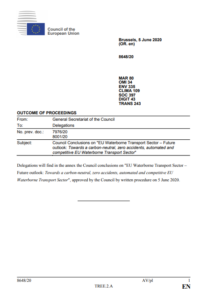The Council of Ministers of Transport adopted on 5 June its conclusions on “EU Waterborne Transport Sector – Future outlook: Towards a carbon-neutral, zero accidents, automated and competitive EU Waterborne Transport Sector”. This decision endorses the Opatija Declaration adopted at political level on 11 March 2020.
The Council will specifically focus on 5 pillars. Let’s examine them:
Carbon-neutral and zero pollution waterborne transport sector
The Council welcones the Commission’s Communication on the European Green Deal which aims to accelerate progress towards a fully sustainable EU waterborne transport sector within a fair and prosperous society, with a modern, resource-efficient and competitive economy where there are no net emissions of greenhouse gases in 2050 and where economic growth is decoupled from the use of resources.
It also welcomes all the existing national strategies and initiatives aiming to decarbonise the waterborne transport sector;.
Digital transformation
The Council acknowledges the opportunities created by the digital transformation of the waterborne transport sector enabling seamless multimodal transport operations. Moreover it supports the ongoing work at European and international level in relation to maritime high-level automation and autonomous ships and encourages the work in IMO and in CESNI for the establishment of an appropriate goal-based and technology-neutral legal framework and relevant technical standards to enable safe and secure operation of autonomous ships, including initiatives to facilitate the parallel operation of non-autonomous and autonomous ships.
Competence and training of the future seafarers and inland navigation workers
The Council calls upon the Commission and Member States to intensify their efforts at IMO level for an ambitious review of the STCW Convention in response to the current challenges and increased technological demands and developments, whilst reflecting the deployment of the necessary skills for seafarers.
In addition, it reaffirms the importance of the European Social Dialogue in maintaining attractive working conditions and adequate social protection for seafarers and inland navigation workers by effectively applying, amongst others, the Maritime Labour Convention and the relevant agreement with the social partners;
Furthermore, it encourages measures to preserve the conditions for a social level playing field, while it supports further development of CESNI standards to uphold the necessary skills for crewmembers on board inland navigation vessels.
Zero accidents
The Council underlines the importance of cultivating and promoting a maritime safety culture, based on “just culture”, of zero accidents by 2050 and call upon the Commission and Member States to exploit fully the synergies that will derive from the green and digital transformation of the waterborne sector.
A world-leading waterborne transport sector in the EU
The Council acknowledges that the EU faces unfair trade practices and limited market access in certain third countries and stresses the need for coordinated action to safeguard EU maritime interests and collectively promote free and reciprocal access to international maritime services.
Additionally it calls upon the Commission and Member States to intensify efforts to maintain a global level playing field based on high international standards for safety, environment, skills and labour conditions, thereby creating the conditions for a thriving EU waterborne transport sector in an increasing international competitive environment; in this regard, it highlights the importance of ambitious Free Trade Agreements and maritime transport agreements between the EU and third countries to promote a global level playing field for international maritime services.
Commenting on these conclusions, said Martin Dorsman, ECSA Secretary-General, stated:
The European shipping industry was very much part of the discussions that shaped the Opatija Declaration. The vision set out in the declaration fully reflects the ambitions of our sector and sets the direction in which we have been moving rapidly towards
However, ECSA reports that the progress towards that vision has come to a halt since the onset of the COVID-19 pandemic, which has affected the whole maritime industry in Europe and the rest of the world. Despite the various difficulties the crisis has created, such as the lack of crew changes and liquidity issues, companies and employees continue to work to ensure the supply chains stay running.
We fully appreciate that the Ministers recognise the pivotal role of European shipping during this crisis in keeping trade and the flow of basic services and supplies running as smoothly as possible. It is important that all policymakers understand this paramount role and the strategic interests of shipping for the EU, which this crisis has clearly put under the spotlight, and which should never be compromised
continued Mr Dorsman.
































































